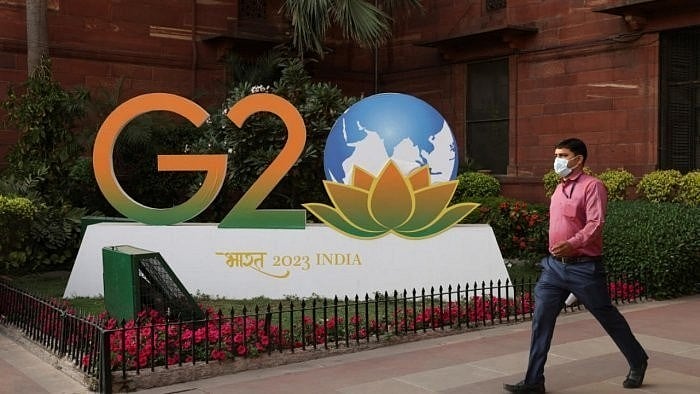
G20 logo.
Credit: PTI Photo
The much-discussed G-20 summit concluded recently. Since India assumed the presidency of the group last year at the Bali summit, there has been a remarkable record of over 200 meetings covering diverse issues held in various parts of the country leading up to the summit.
In his inaugural address, Prime Minister Modi eloquently delved into the theme of ‘One Earth, One Family, One Future’ by referring to the ancient Indian belief in ‘Vasudaiva Kutumbakam’. He expressed concern over the ‘global trust deficit’ and stated, “This is a time for all of us to walk together on issues relating to the turbulent global economy, the North-South divide, the distance between East and West, and collectively work with a ‘human-centric’ approach to find solutions to major issues like terrorism, food and energy crises, health, water, and cyber security, not only for the present but also for future generations.”
In alignment with India’s goal of making the African Union (AU) a permanent member of the Group, he announced this decision in his address and invited the Chairperson of the AU to join other leaders at the high table. By doing so, Modi continues India’s historic mission of bringing Africa into the mainstream of the international community—a goal India has pursued since the days of the Bandung conference. Including the AU in the G-20 symbolised inclusion and was aimed at strengthening the voice of the Global South in negotiations with the developed North.
Modi’s references to the Global South are also a continuation of former Prime Minister Indira Gandhi’s pioneering role in getting the New International Economic Order resolution passed at the UN General Assembly in 1974 and her vigorous pursuit of North-South dialogue and the initiation of South-South dialogue to overcome the inequities within the South. These dialogues faced tough challenges with the onset of liberalisation, privatisation, and globalisation (LPG).
On Ukraine
The most significant aspect of the Delhi Declaration was the consensus on the Ukrainian issue. Without explicitly naming Russia, the Declaration emphasised the need for all countries to “abide by the UN charter and refrain from the threat or use of force to seek territorial acquisition against the territorial integrity and sovereignty or political independence of any state”. It also voiced concerns about the negative impact of the war on the economies of countries and opposed the threat or use of nuclear weapons, implicitly addressing Russia’s actions. The Western powers, particularly the US, which was keen on a direct reference to Russia, ultimately compromised to ensure the success of the Delhi summit. However, Ukraine expressed dissatisfaction with the statement, cryptically stating, “There is nothing to be proud of!”
The announcement by PM Modi about the creation of an International Biofuel Alliance and the proposed launch of a G-20 satellite mission for environmental and climate observations are noteworthy. References to the need for enduring equitable growth, getting sustainable development goals (SDGs) back on track, ensuring food security, battling the climate crisis while agreeing upon climate financing ratios with a larger share of responsibilities by the developed North, preparing for health emergencies, reforming multilateral development banks (MDBs), dealing with the debt crisis, spreading digital public infrastructure (DPIs), generating jobs, bridging the gender gap, and giving a clear voice to the Global South in negotiations to bring about positive and equitable transformation within the G-20 group and beyond were timely.
However, these are ticklish issues that call for sincere cooperation in a spirit of give and take by the member nations. The French President struck a realistic note when he said the climate deal reached in New Delhi was insufficient. If we add to this the West’s refusal to admit its contribution to global pollution, the picture that emerges is not very optimistic.
The summit announcement about the establishment of an India-Middle East-European Economic Corridor is ambitious. But it must be backed up by the requisite financial support from the participating countries.
Finally, while the summit’s declarations constitute a milestone in the history of the G-20 and a feather in India’s cap, concerted efforts are imperative to bring to fruition the lofty goals.
(The writer is a former professor of political science at Bangalore University)